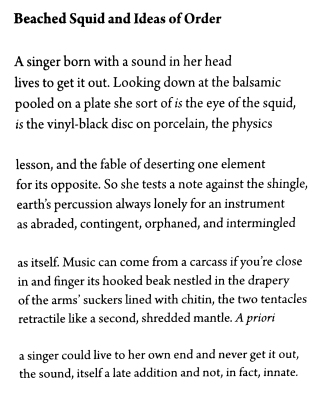To continue my poetry gratitude series: Ken Babstock. When I returned to poetry this past summer after a long hiatus, I picked up Babstock’s book Swivelmount (2020) and headed for the rooftop of my building. Opening the book at random, I began reading a sonnet, “Beached Squid and Ideas of Order” and knew that this is what I wanted once again: to lose myself in unruly and expanding realms, and to get my hands inky, one poem at a time.
Yesterday, I picked up “Beached Squid and Ideas of Order” again and decided to do a deep dive into that poem as well as the source of its parody, Wallace Stevens’ “The Idea of Order at Key West.
”Stevens’ poem is in the form of an argument hinging on the relationship between art and nature. The speaker concludes that the singer’s voice heard along the beach is transcendent and transformative, and he asserts that “song and water were not medleyed sound.” Instead, the solitary heroine/muse has become a shamanistic creator, a changer of perception, even a colonizer of nature.
And while the influence of the singer’s “rage to order words” becomes more powerful, meanwhile the water, sea, and sky recede into the darkness after sunset. The song casts a spell on the lights of the anchored fishing boats, which seem to shine more brightly. These lights, thus intensified, have “mastered the night, portioned out the sea.” Musical language subsumes and transforms the world of the sea and of humans through the power to assert order by means of the song’s “keener sounds.” And even as those worlds are born into impermanence, the singer’s voice, her imagination, makes “the sky acutest at its vanishing.”
There’s something sacerdotal about the role assigned to the singer-poet, who effects a transubstantiation (or sleight of hand, if you prefer): keen sounds assume the power to invoke bright lights, even as the world vanishes into darkness. Song and singer order words in “ghostlier demarcations,” as if the “blessed order” of the words takes on a magical power.
I’ve never felt quite comfortable with Stevens’ idea of order, or with a priestly role for poets. So I found it refreshing that Babstock’s “Beached Squid and Ideas of Order” dissects Stevens’ shamanistic “rage for order.” He also dissects with his scalpel of words the carcass of a beached squid, which itself assumes the agency of creating music, if one gets close enough and plays it like an instrument, for “earth’s percussion” is “always lonely for an instrument / as abraded, contingent, orphaned, intermingled / as itself.”
As to the singer, she may have been “born with a sound in her head” that she lives to release. However, “a singer could live to her own end and never get it out, / the sound, itself a late addition and not, in fact, innate.” Whereas Stevens elevates the singer’s “keener sounds” to a sublime urgency to order the world, thus making her in turn his own instrument-muse, Babstock’s singer is an earthly instrument – and a very recent addition to the world at that. And her art is, like that world, “abraded, contingent, orphaned, intermingled.” Lovely.
Here’s Babstock’s poem:
